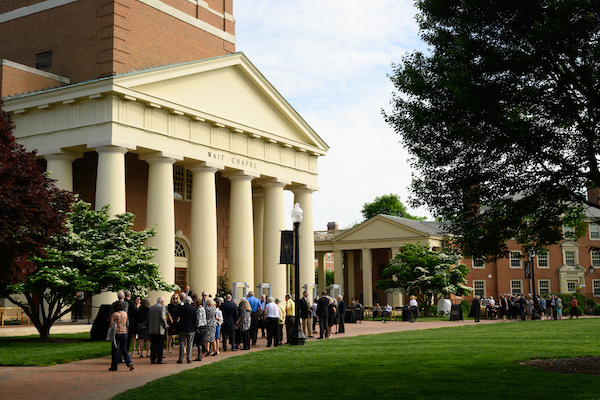
THE CELEBRATION of Provost Emeritus Edwin Graves Wilson’s life proved an affirmation of old-fashioned virtues that never go out of style and of heartfelt devotion to a family man, university leader and professor of Romantic poetry. In keeping with the most sacred of rituals, Wake Foresters found solace and joy in a memorial service to share appreciation for having known such a man as Ed Wilson.
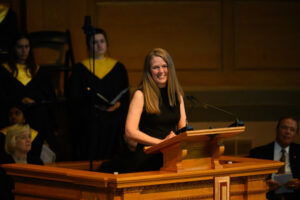
Laurie Turnage Wilson
“If you were a student of Dr. Wilson, … please stand,” said Laurie Turnage Wilson (’93, MAEd ’94), Dr. Wilson’s daughter-in-law. All around Wait Chapel and representing myriad generations, the former students rose and turned to acknowledge one another. Then Wilson treated those alumni in particular to a reminder of “days in Tribble Hall, when you were young and perhaps a bit more carefree.”
She recited “The Lake Isle of Innisfree” by William Butler Yeats. At one point, another former student, Marybeth Sutton Wallace (’86), did the same, reciting Yeats’ “The Song of Wandering Aengus.” She said after the service that memorizing the poem “was my way to honor Dr. Wilson,” because Dr. Wilson, who taught generations of students of English literature, could recite lines of poetry until nearly the end of his life. He died March 13 at 101 years old.
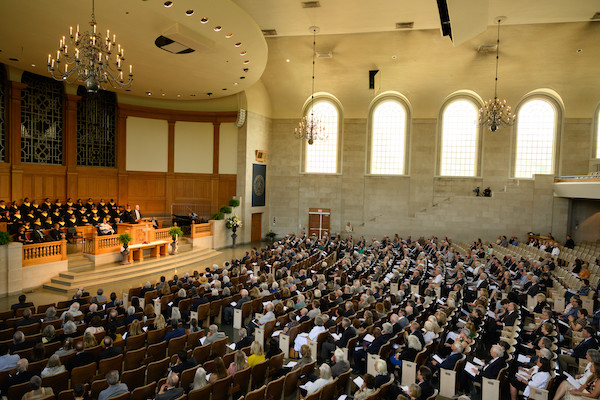
Poetry. Scripture. Hymns. Stories of kindness and finding the best in others. The homily by The Rev. Douglass M. Bailey III (’60) likening Dr. Wilson to “The Lion King.” A specially prepared chapbook, “Selected Poems From The Teachings of Dr. Edwin G. Wilson,” for every attendee.
These were the fitting elements of the 90-minute service. So, too, were the trappings of a luncheon that felt like an old-style picnic on the Quad: barbecue with sides, ice cream, guestbooks to sign and magnolia garlands draped around lamp posts and the famous arch.
“You must remember this / A kiss is just a kiss / A sigh is just a sigh / The fundamental things apply / As time goes by.” From Wait Chapel’s tower, the carillon’s bells pealed out the melody. It was from “Casablanca,” Dr. Wilson’s favorite movie.
Below are excerpts from memorial service eulogies. You can listen to the speakers and view the service in full here.
Edwin G. Wilson Jr. (JD ’93)
Son and special superior court judge in North Carolina
I do want to take a minute and tell you a little bit about my father, in particular, his kindness, his sense of honor, his courage and what he was like as a father. I was in court in Wilkes County one time, and a lawyer said to me, “Your father once told me something that I’ve never forgotten. He told me to be kind and be honorable.”
Be kind and be honorable. That’s pretty good advice.
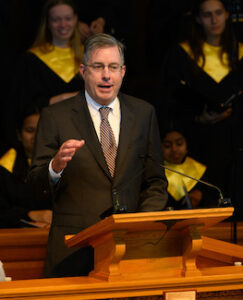
Edwin G. Wilson Jr.
My father was kind. I bet almost everyone here could tell a story of how he spoke at your wedding or came to your concert or wrote you a note. Maybe he got you into Wake Forest. Maybe he kept you in Wake Forest. But today I’m going to talk a little bit more about being honorable.
I remember being a young boy and saying to him one time, “Have you ever lied?” And he said, “Yes. It was 1943.”
(The audience laughed at the thought. “Well, that wasn’t meant to be funny. I mean, I think he told a few small ones since then,” Wilson Jr. said. His father wanted to go off to World War II but didn’t answer naval recruiters truthfully about having had asthma as a child. His request to enlist in 1943 was accepted.)
–––––
He cared little for money and, in fact, firmly believed that the love of money was the root of all evil. I doubt he could tell you the price of gas. You would have never discussed with him buying a car, opening an IRA or making a down payment on a house. And yet, once I found a set of 24 volumes of Theodore Roosevelt’s writings, and the volume was signed by Roosevelt’s wife, and it was $1,500, and I called my dad and said, “What do you think?” And he said, “Well, you have to buy it, of course.”
I know many of you went to him seeking career advice. I’m willing to bet he never said about a job: “How much does it pay?”
–––––
My father got to be 101 by enjoying the little things in life. It helped that he never had a cell phone or did his own email, or, heaven forbid, used social media. He lived each day visiting with you, reading on the porch or in front of the fire, enjoying a movie or playing charades and watching a basketball game with my mother. And he also lived that long because he had been kind to people, and they, in turn, had been kind to him. Most importantly, he also had a pretty clear conscience knowing that he had tried to live a life of honor.
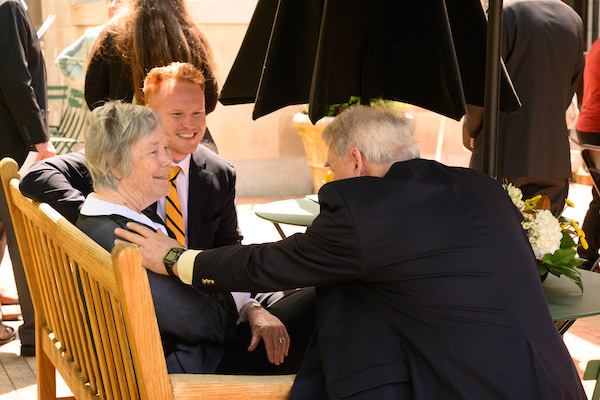
Emily Wilson sits after the service with Logan Healy-Tuke (‘14), who grew close to the Wilsons when he was a student.
Jeanne Whitman Bobbitt (’79, MBA ’87)
Longtime friend and trustee
His unimpeachable character helped shape Wake Forest, and his joy in his friends marked his life and us indelibly. … And let it not be forgotten that while he was “Mr. Wake Forest,” whose words inspired and delighted, he was also one of the chief strategists of a university built on intelligent and humane principles. He proved time and again that great leaders can be kind, empathetic and honorable and, indeed, should be.
Ed Wilson knew that ideas and people build great institutions, and he sought and attracted both.
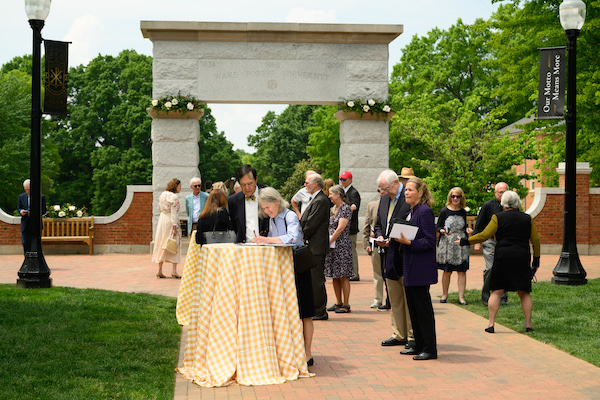
–––––
Before the term “personnel” became “human capital” or “talent management,” Ed Wilson treasured people and their relationships as the center and engine of the enterprise. He worried about external forces at work on the University, particularly about what he called the corporatization of the academic world. He saw in that a threat to the power of relationships and to human kindness.
Reid Morgan (’75, JD ’79, P ’14, ’19)
Friend and retired University senior vice president and general counsel
At every opportunity under Dr. Wilson’s leadership, the University became more inclusive, welcoming and affirming to all. …
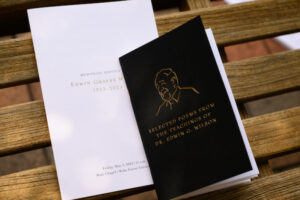 On occasion, Dr. Wilson could also challenge Wake Forest to live up to its ideals. He entitled a speech made on Founders Day in 1992 “To Honor the Legacy.” It was a kind of valedictory address made in this chapel upon his retirement as provost, after 23 years.
On occasion, Dr. Wilson could also challenge Wake Forest to live up to its ideals. He entitled a speech made on Founders Day in 1992 “To Honor the Legacy.” It was a kind of valedictory address made in this chapel upon his retirement as provost, after 23 years.
The new wing of the Reynolds Library was being named for him. It was a time nine years into the Hearn administration, when Wake Forest was prospering in the midst of what was called a rebuilding of the campus. But Dr. Wilson’s words hearkening to scripture were meant for all times when he urged the University to maintain due perspective on its growth and be “certain that as Wake Forest grows in wealth, prestige and success — as Wake Forest, so to speak, gains the whole world — it will not lose its own soul.”
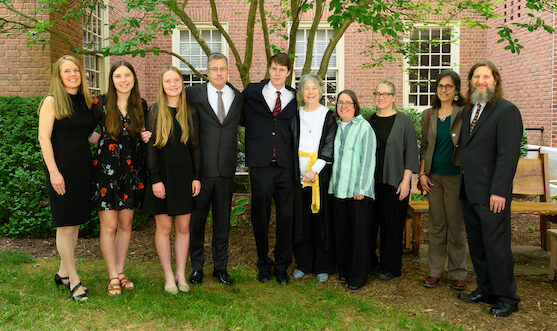
Ed and Emily Wilson’s family includes a son, Edwin G. Wilson Jr., and daughters Sally and Julie. From right, John Steele and spouse, Julie Wilson; Carolyn Stevenson and spouse, Sally Wilson; Emily Herring Wilson; and the Wilson Jr. family: son Harry; Wilson Jr.; daughters Ellie and Maria; and spouse, Laurie Turnage Wilson. (The other Wilson Jr. son, Edwin G. “Buddy” Wilson III, watched the livestream from his study-abroad program in Botswana.)<br />
–––––
I have often thought about the power of his words, but especially in recent weeks, my mind has turned also to the abundant joy at the center of his life. Whether it was in class, where, three days a week, time stood still as he exhibited the jewels of literature to an overflowing class or at a University event, where every person with whom he spoke felt his keen interest in them and in their lives. Or with Emily and the family, where he could relax into his most cherished role as husband, father and grandfather.
It was his joy that illuminated his face and enlivened his resonant voice. His joy captured our hearts. Through his words and example, we learned great truths. Through his joy, we made them our own.
